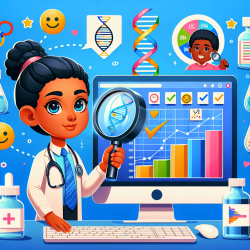Introduction
The integration of genomic insights into educational and clinical practices is revolutionizing fields like speech-language pathology. The research article titled "Implementation and evaluation of personal genetic testing as part of genomics analysis courses in German universities" provides a compelling case for incorporating personal genotyping into educational curricula. This approach not only enhances the learning experience but also equips practitioners with the skills necessary to make data-driven decisions that can improve outcomes for children in speech-language pathology.
Understanding the Research
The study conducted at the Hasso Plattner Institute and the Technical University of Munich involved implementing personal genotyping in genomics courses. The objective was to evaluate the educational impact of personal genetic testing (PGT) on students' attitudes and understanding of genomics. The results were promising, with a significant number of students finding the genotyping component useful and recommending its inclusion in future courses.
Implications for Speech-Language Pathology
For practitioners in speech-language pathology, the implications of this research are profound. Understanding genetic predispositions can play a critical role in diagnosing and tailoring interventions for children with speech and language disorders. By integrating genomic data into practice, speech-language pathologists can:
- Identify genetic markers associated with speech and language disorders.
- Develop personalized intervention plans based on genetic profiles.
- Enhance predictive accuracy for developmental outcomes.
These data-driven approaches can lead to more effective and targeted therapies, ultimately improving outcomes for children.
Encouraging Further Research
The study highlights the importance of genomic education and its potential to transform clinical practice. Speech-language pathologists are encouraged to explore further research in genomics to understand the genetic underpinnings of speech and language disorders better. Collaboration with geneticists and other healthcare professionals can foster a multidisciplinary approach, enhancing the quality of care provided to children.
Conclusion
The integration of personal genotyping into educational curricula, as demonstrated in the German universities study, provides a valuable framework for advancing speech-language pathology. By embracing genomic insights, practitioners can make informed, data-driven decisions that enhance therapeutic outcomes for children. To read the original research paper, please follow this link: Implementation and evaluation of personal genetic testing as part of genomics analysis courses in German universities.










